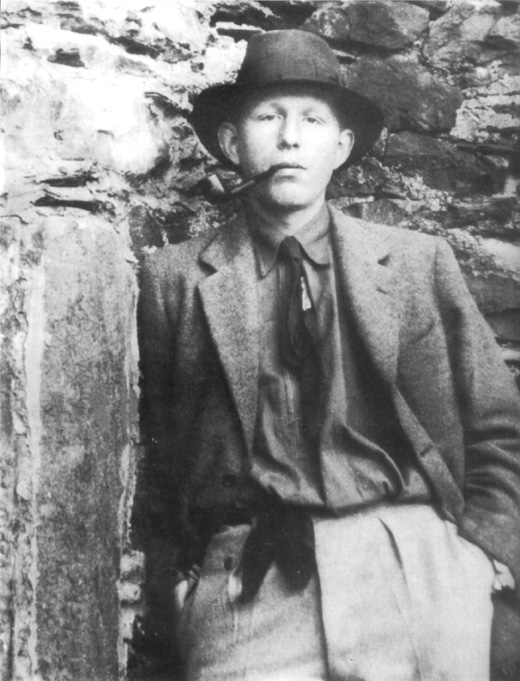 PREVIOUS PAGE:
Auden wearing the black felt wide brim hat much disliked by Christopher Isherwood.
In: OSBORNE, Charles, W. H. Auden: The Life of a Poet, London, Macmillan, 1982, p. [78]
PREVIOUS PAGE:
Auden wearing the black felt wide brim hat much disliked by Christopher Isherwood.
In: OSBORNE, Charles, W. H. Auden: The Life of a Poet, London, Macmillan, 1982, p. [78]
Macao has frequently been the subject of English and American novels (particularly thrillers like Daniel Carney's Macao), and films (such as the 1950s "Macao", starring Robert Mitchum and Jane Russell), but it has not been much celebrated in English and American poetry. Of course, many poems have been written in which Macao figures prominently, but the poems are mainly very second-rate. Macao is, nearly everywhere, presented as a dangerous center of crime, and little more. But once, in 1938, Macao was the subject of a first-class poem by a first-rate poet, W. H. Auden.
His visit to Macao came at the crux of a lengthy tour of China at the height of the Chinese-Japanese war, and he found in Macao a symbol of peace and normal humanity in an age of storm and violence. His poem is witty and perceptive, his images striking and historically aware. But to appreciate his poem, it is necessary to see it against the background of Auden's own time as the culmination of his travels in China.
In 1938 W. H. Auden, perhaps the greatest English poet of the twentieth century (remembering that William Butler Yeats was Irish and T. S. Eliot, American), and his friend Christopher Isherwood traveled to China. Both had developed reputations as good writers about journeys to strange places, and their publisher had given them a contract to write a 'travel' book about any country or area of their choice. In 1937, war had officially broken out in China, as the Japanese had invaded, occupying a large part of the country and many of the large cities, including Shanghai. Auden had been in Spain briefly during the Spanish Civil War (1935-1940), and had been impressed by the ominous, new, mass struggles of our century motivated by ideological and racial conflicts, as opposed to the old narrowly nationalistic and dynastic wars of the nineteenth-century. He had written a fine, prophetic, poem, Spain 1937, and, though he had had no particular interest in China before, saw it as a natural destination now.
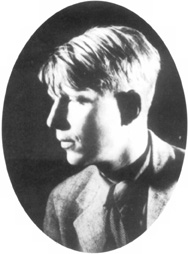 Wystan Hugh Auden
(°1907-†1973)
Wystan Hugh Auden
(°1907-†1973)
Isherwood and Auden planned to do a joint book, of which Auden would write the "poetic part" and Isherwood write the prose narrative. The book was called Journey to a War, and was published in 1939. Auden's contribution was chiefly a sonnet sequence and verse commentary called In Time of War.
The experiences of Auden and Isherwood in China are rather difficult to describe. Viewed from one perspective, much of their journey was farcical, the sort of thing that would have been well described by Evelyn Waugh, the brilliant contemporary satiric novelist. They were not reporters, in the usual sense. They were writers, intending to travel and see what they could, and, like travel writers, to give their impressions of the country, the people, and, above all, the war. They knew no Chinese language, and knew little or nothing about China before they departed for Hong Kong. Much of the tone of their letters and notes gives the impression of bright, sophisticated English schoolboys greatly amused by the behaviour of foolish foreigners. They took pleasure in the fact that they in turn very much puzzled the Chinese who were, quite naturally, curious as to what their purpose was, and who they were. The Chinese were by this time accustomed to important foreign visitors, but previously the visitors had been either diplomats or reporters, whose behaviour tended to follow a predictable path. They did not know what to make of Auden and Isherwood, and one can see why. The Englishmen entertained themselves with singing comic songs, laughing at private jokes, taking photographs at odd moments, and assiduously seeking out homosexual entertainments in high good humour. 1
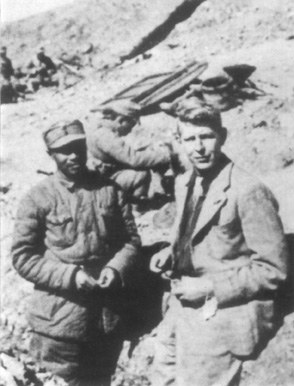 Auden at the war front, in China.
A photograph published in Journey to War. In reality, Auden and Isherwood, during their trip to China rarely saw any fighting.
In: OSBORNE, Charles, W. H. Auden: The Life of a Poet, London, Macmillan, 1982, p. [ 173].
Auden at the war front, in China.
A photograph published in Journey to War. In reality, Auden and Isherwood, during their trip to China rarely saw any fighting.
In: OSBORNE, Charles, W. H. Auden: The Life of a Poet, London, Macmillan, 1982, p. [ 173].
Yet, in spite of this frivolity, the book that Isherwood and Auden eventually produced is quite remarkable. They were experiencing the chaos of China at war, but both seemed to sense that they were actually experiencing the future — that is, the massive, mobile wars with no real frontlines, marked by indiscriminate air-raids, wars in which civilians far more than in the past were either the intended targets of destruction or were slaughtered without a thought. In spite of the levity of much of Isherwood's and Auden's behaviour, the tone of the book is sympathetic to the sufferings of the Chinese people — not as Chinese, but as the representatives of the suffering countless millions who were to be the victims of the twentieth century.
Auden and Isherwood arrived in Hong Kong on the 16th of February, 1938. They were not impressed by Hong Kong. Particularly they disliked their British compatriots who, along with the Chinese merchants of the city, seemed totally unaware of the vast conflict going on within China, hearing only distant echoes of the suffering of a new age, pursuing their business and social interests oblivious to the atrocities of the Japanese occupation. They were also for a short time in Macao. A few days later they sailed up the Pearl River to Guangzhou. Their introduction to 'real' China came as they were at a tea-party given at the British Consulate, and a Japanese air-raid struck the city. The British tourists may have been silly in their behaviour, but they were not cowards, and the air-raid gave them their first sense of the reality of the war they had come to describe. They collected camp beds and mosquito nets for their journey, and on the 4th of March took a train for Hankow (Wuhan).
Arriving at Hankow, the wartime capital of China during that stage of the conflict, they felt a strange excitement. They lived in their camp beds under cramped conditions in the British Consulate. Isherwood recorded in his diary that"[...] we would rather be in Hankow at this moment than anywhere else on earth."2 They were introduced to Chinese officials, at one point meeting the sophisticated Madame Chiang and later, the Generalissimo himself.3 They attended press conferences, trying to find out from real journalists what was going on in the war. Their sense of being present at a new era of human history was heightened when, on the 12th of March, they were informed by a German they had met from the Generalissimo's German military advisory staff that Hitler had invaded Austria.
A little later, they encountered one of the famous "Friends of China", Agnes Smedley, an English woman long sympathetic to the cause of the Chinese communists. She, and Anna Louise Strong, Edgar Snow, and others were making the world become aware of the growing significance of communist power in China. Though vaguely of the European Left, Auden and Isherwood were by now almost completely disinterested in politics. However, they picked up a few insights from Smedley and others, so that they were not startled by the communist victory after the war against Japan.
On one occasion, they witnessed a Japanese air-raid from the roof of a tall building. Isherwood admitted to a certain fear, but Auden seemed totally unconcern, later sleeping and snoring soundly while Isherwood tried pills to get to sleep.
They spent a lot of time trying to get to the 'front lines', and set out several times with escorts to go to one place or another where fighting was going on. Eventually they were able to travel to the eastern front near Suzhou and visited front-line trenches, coming under Japanese rifle and artillery fire, and being in an area attacked by Japanese warplanes. They encountered civilian dead and the bodies of soldiers for the first time. The body of one Chinese soldier, covered with lice, became the starting-point for the finest poem that Auden wrote arising from their Chinese experience. It is sonnet no 13 in the Sonnets from China sequence:
"Far from a cultural centre he was used:
Abandoned by his general and his lice,
Under a padded quilt he turned to ice
And vanished. He will never be perused.
When this campaign is tidied into books:
No vital knowledge perished in that skull;
His jokes were stale; like wartime, he was dull;
His name is lost forever like his looks.
Though runeless, to instructions from headquarters
He added meaning like a comma when
He joined the dust of China, that our daughters
Might keep their upright carriage, not again
Be shamed before the dogs, that, where are waters,
Mountains and houses, may be also men."4
Though rapidly becoming a pacifist himself, Auden saw in the dead body covered by lice riot simply a man abandoned by his generals — a common, ordinary man, but one whose death was not entirely useless. When he died ("[...] joined the dust of China [...]") by a death that had meaning — not great meaning, but a little meaning, as a comma clarifies the meaning of larger units of language — his death had a purpose that he himself might not have known, to show that "[...] where are waters/Mountains and houses, may be also men." Auden, on his return to Hankow, read this poem to a group of Chinese writers and intellectuals, and the sonnet was later published in a Chinese translation in the newspaper "Ta Kung Pao". However, it was subject to some cultural and political censorship, for the line "[...] abandoned by his general and his lice [...]" was altered to "The rich and poor are combining to fight."5
On another occasion, they set out to 'find' the front at Meiki with a real traveler, Peter Fleming(who had already made a name for himself as a shrewd observer of the Chinese scene in his travels through central and western China in the early 1930s, related in his book News From Tartary). Fleming's fame was later to be overshadowed by that of his younger brother, Ian, creator of the spy novels starring James Bond, for whom his brother Peter is supposed to have been a model. Fleming was a professional reporter and travel writer, on assignment in China from "The Times". He spoke Mandarin, and knew how to travel in China. His knowledge of politics was profound as that of any foreign observer in China, not having been confined to missions and consulates, but steadily insisting upon seeing the war for himself, in the field, and on interviewing generals and soldiers personally. However, they never saw the front, for by the time they came near it, the Japanese had nearly broken through the Chinese defenses, and a general retreat had been ordered.
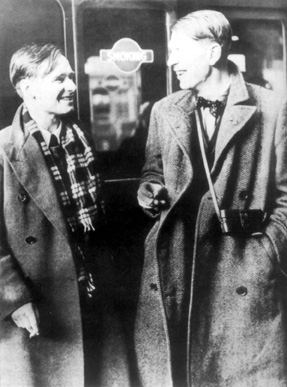 Auden and Isherwood just before leaving for China.
In: OSBORNE, Charles, W. H. Auden: The Life of a Poet,
London, Macmillan, 1982, p. [172].
Auden and Isherwood just before leaving for China.
In: OSBORNE, Charles, W. H. Auden: The Life of a Poet,
London, Macmillan, 1982, p. [172].
Auden and Fleming argued a great deal about politics as they wandered, frequently on foot, making their way to Shanghai. Auden was a typical liberal of the 1930s — vaguely sympathetic to all things socialist, and a distant admirer of the Soviet Union while knowing hardly anything about it or its system. Fleming was one of the relatively few international reporters of the period who were sceptical of the brave new world. His sharp judgment was based upon personal observation — he had traveled widely in the Soviet Union — and had a passion for seeing things as they are rather than theorizing over a coffeetable. Auden never became less than a liberal, but his leftism, which had been dealt a blow by the realities of Spain, was not to survive much longer, and it is quite possible that his long conversations with Fleming amid the mud and confusion and exhaustion of the retreat gave his leftism the coup de grace. Though Auden's tone in his letters was mocking, we can sense a genuine pride in his declaration that "We've been on a journey with Fleming in China, and now we're real travellers for ever and ever; we need never go further than Brighton again."6 And, in spite of his later political development, Auden had become and remained a staunch "Friend of China"
Although Auden and Isherwood (Au Dung and Y Hsaio Wu spelled phonetically in Chinese characters — thereafter, Christopher often signed himself in letters to Auden, "Issywoo") made jokes about the war's not being real (the shooting was not loud enough for a real war, they reported), 7 it is clear that they had seen enough of the reality to satisfy themselves that they did not want to experience a war first-hand. The most impressive of Auden's Sonnets from China is no 12, which catches a moment of boredom at a military headquarters, and highlights the distance from killing which makes killing easy. Auden, in his image of the "[...] telephone [...] talking to a man [...]" seems prescient of the future, in which a computer talks to a man, giving orders and taking no moral responsibility for what happens. A seeming vacuum is created. But, Auden insists, there is a real relationship between words and events; there is an ultimate responsibility.
"Here war is harmless like a monument:
A telepone is talking to a man;
Flags on a map declare that troops were sent;
A boy brings milk in bowls. There is a plan
For living men in terror of their lives,
Who thirst at nine who were to thirst at noon,
Who can be lost and are, who miss their wives
And, unlike an idea, can die too soon.
Yet ideas can be true, although men die:
For we have seen a myriad faces
Ecstatic from one lie,
And maps can really point to places
Where life is evil now.
Nanking. Dachau."8
Auden's perception in this sonnet is suggestive of the passage in one of his greatest poems, Musée des Beaux Arts, written within a few months of the sonnets, in which he illustrates the boring banality of evil:
"They (the Old Masters) never forgot
That even the dreadful martyrdom must run its course
Anyhow in a corner, some untidy spot
Where the dogs go on with their doggy life and the torturer's horse scratches its innocent behind on a tree."9
Although the resulting 'travel' book, Journey to a War, was by no means a great book, it was distingished by some fine Auden poems and some perceptive descriptions and narrations by Isherwood. It made good reading, and was not as politically tendentious as many of the other books of the same genre in the period. Its critical reception was decidedly mixed, some reviews emphasizing the curious structure of the book, half poetry, half prose. Evelyn Waugh described it as two books, stuck together like the front and hind parts of a pantomime horse.10 But most reviews chastised the authors for their lack of political seriousness in a political age. 11 A good example of this lack of political seriousness may be seen in an abstract from Journey to a War in which Isherwood describes Japanese-occupied Shanghai as a haven of delight for those with decadent tastes:
"You can buy an electric razor, or a French dinner, or a well-cut suit. You can dance at the Tower Restaurant on the roof of the Cathay Hotel, and gossip with Freddy Kaufmann, its charming manager, about the European aristocracy or pre-Hitler Berlin. You can attend racemeetings, baseball games, football matches. You can see the latest American films. If you want girls, or boys, you can have them, at all prices, in the bath-houses and the brothels. If you want opium you can smoke it in the best company, served on a tray, like afternoon tea. Good wine is difficult to obtain in this climate, but there is enough whisky and gin to float a fleet of battleships. The jeweller and the antique-dealer await your orders, and their charges will make you imagine yourself back on Fifth Avenue or in Bond Street. Finally, if you ever repent, there are churches and chapels of all denominations."12
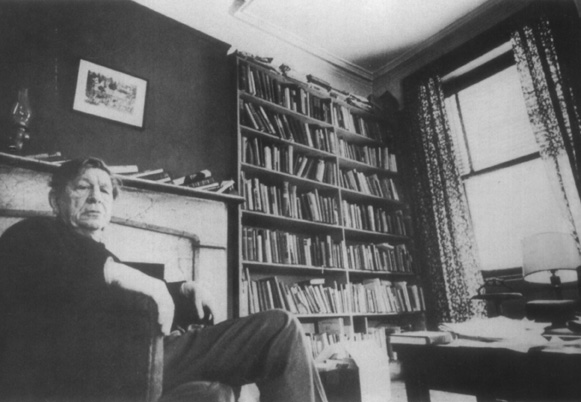
Auden in his New York residence shortly before leaving the States for good in February 1972.
In: OSBORNE. Charles. W. H. Auden: The Life of a Poet, London, Macmillan, 1982, p. [269].
Auden and Isherwood departed from Shanghai to America on the 12th of June 1938, after about four months in China. They were keenly aware that they had accumulated only a tourist's knowledge and experience of China, but they had stayed longer than most reporters had stayed, and they had deliberately exposed themselves to considerably more danger than most foreign visitors would have done, so they really had no need to feel ashamed. Auden, in particular, was deeply impressed, and puzzled by China. Auden himself was a man of profoundly conservative mind, and of philosophial interests and beliefs that were semi-religious but basically humanistic. Aspects of Chinese society attracted him very much. "I thought it the nicest country I had ever been in, [...]"13 he remarked to his friend E. R. Dodds. But at the same time, the strangeness of China left him in wonderment: "China was utterly different. Spain as a culture one knew. One could understand what was happening, what things meant. But China was impossible to know. A country which, quite apart from fighting a war, just had no respect towards human life."14 On the last point, Auden, the ultimate sophisticate, responded to China as almost all western travelers had always done.
After traveling through America, confirming and contracting arrangements with American publishers, and enjoying a certain amount of tourism, Auden and Isherwood returned to Europe within the month. Auden immediately set to work actually writing the poems for which his ideas and impressions had been accumulating, and, instead of remaining in England, went to Brussels. He worked at his poetry for part of each day, but spent a great deal of time in the Brussels museums and bath houses. While in the former, his study of the Brueghels, and works of other painters, led to the great Musée des Beaux Arts. And, as a kind of post script to his Sonnets from China, but not intended to be published with them, he wrote two other sonnets, one on Hong Kong and another on Macao.
The sonnets are included in a separate little series, Voyages, of which Hong Kong is no4 and Macao is no5. As we remarked earlier, Auden was unimpressed by Hong Kong, being chiefly struck by the smart superficiality of both the expatriate and the native community in this little island of relative orderliness on the shore of an unimaginably vast, disheveled, chaotic, and suffering mass of humanity.
"IV. Hong Kong (Dec. 1938)
Its leading characters are wise and witty,
Their suits well-tailored, and they wear them well,
Have many a polished parable to tell
About the mores of a trading city.
Only the servants enter unexpected,
Their silent movements make dramatic news;
Here in the East our bankers have erected
A worthy temple to the Comic Muse.
Ten thousand miles from home and What's-Her-Name
A bugle on this Late Victorian hill
Puts out the soldier's light; off-stage, a war
Thuds like the slamming of a distant door:
Each has his comic role in life to fill,
Though Life be neither comic nor a game."15
The phrase "[...] off-stage, a war [...]" indicates the total inattention to human misery as people go about their "[...] people life, [...]" to paraphrase Auden's words in Musée des Beaux Arts. Auden found Hong Kong boring, and mainly depressing. His reaction to Macao was very different. He was fascinated by the peculiar blend of the European and Iberian culture with the Chinese, a toleration of vice, an adjustment of religion to reality. Whereas he found Hong Kong quite "foreign" to China, a last outpost of Empire, and an island of orderliness in chaos, he found Macao to have created a mixed culture which has become "naturalized". The expatriates of Hong Kong are "Ten thousand miles from home and What's-Her-Name, [...]" whereas Macao is a "[...] weed from Catholic Europe [...]" which has taken root.
"V. Macao (Dec. 1938)
A weed from Catholic Europe, it took root
Between some yellow mountains and a sea,
Its gay stone houses an exotic fruit,
A Portugal-cum-China oddity
Rococco images of Saint and Saviour
Promise its gamblers fortunes when they die,
Churches alongside brothels testify
That faith can pardon natural behaviour.
A town of such indulgence need not fear
Those mortal sins by which the strong are killed
And limbs and governments are torn to pieces:
Religious clocks will strike, the childish vices
Will safeguard the low virtues of the child,
And nothing serious can happen here." 16
The fruit of Macao is a graft, "A Portugalcum -China oddity." The sins of Macao are the sins of the flesh, not those that endanger the soul; they are not the mortal sins, but the venial sins, for which "indulgences" may be found. Auden's wicked pun upon "indulgence", combining "forgiveness" and "enjoyment", illuminates the combination of piety and gambling that must have characterized the life of the Macanese as he and Isherwood viewed things during their brief stay at (almost certainly) the Bela Vista Hotel in February, 1938. Macao was on the brink of international politics, yet was seldom directly involved, throughout the period.
Although Auden was well aware of the Portuguese imperial past in China, it must have seemed to him to have become an irrelevance, in spite of the many martial statues still marking a sometimes violent history. It had faded into the mists of the South China Sea, leaving only this almost naturalized curiosity behind, a blend of Chinese acceptance and endurance with a Southern European Catholic indulgence. The tolerance that he sees in Macao is a quality lacking in the world of 1938, and one that he greatly prizes. When he says, at the end of his poem that "[...] nothing serious can happen here, [...]" he does not speak with dismissive contempt. He means, rather, that the ideological violence and political fury that characterize his own time are not likely to disturb Macao, whose citizens are preoccupied with the business of life. Macao is seen as not just a kind of historical backwater, but a haven of peace. The sins of Macao are the sins of the flesh; but they are not the sins that violate the peace of one's neighbors and oppress them in the name of ideas. Macao was obviously, in 1938, a city that attracted Auden very much, and inspired some of his finest imagery.
As Auden labored upon his poems during the winter of 1938-1939 in Brussels, where the constant thunder of impending war was to be heard in every radio newscast (Austria had been occupied by Hitler, and now the crisis of Czechoslovakia and the Sudetenland was in full possession of the newspaper headlines — Germany was to occupy Czechoslovakia in a few weeks, and the September, 1939, invasion of Poland and full-scale European war were only six months away), he must have reflected rather fondly upon the tiny island of relative peace and calm in Macao, where "[...] nothing serious [... could] happen. "17
NOTES
1 CARPENTER, Humphrey, W. H. Auden: A Biography, London, George Allen & Unwin, 1981, p.239 — The author recounts in his biography of Auden their pursuit of such amusement in the bath houses of Guangzhou and Shanghai, making no attempt to conceal their activities, as did most other foreigners and Chinese.
2 CARPENTER, Humphrey, op. cit., p.239 — A moment of exhilaration which quickly passed upon their learning of the Nazi invasion of Austria.
3 CARPENTER, Humphrey, op. cit., p.236 — They were impressed by Madame Chiang (who fed them cake), but Auden reported that Chiang Kai-shek "[...] looks like a country doctor."
OSBORNE, Charles, W. H. Auden: The Life of a Poet, London, Macmillan, 1979, p. 156 — Where the meeting is treated in a bit more detail.
4 MENDELSON, Edward, ed., W. H. Auden: Collected Poems, London, Faber and Faber, 1976, p.154.
5 CARPENTER, Humphrey, op. cit., p. 238.
6 Ibidem., p.239.
7 Ibidem., p.238.
8 MENDELSON, Edward, ed., op. cit., pp.153-154— Naking [Nanjing] refers, of course, to the "Rape of Nanking" of the previous year, an event which had become memorialized in much the same way as the Fascist bombing of Guernica, Spain, had been. Dachau was a notorious concentration camp in Germany.
9 Ibidem., p.147 — Auden is referring to a "Crucifixion" painting by the late medieval Flemish painter Brueghel, to whose work a part of the Musée des Beaux Arts in Brussels is dedicated.
10 HYNES, Samuel, The Auden Generation, Princeton/New Jersey, Princeton University Press, 1976, p.343.
11 HYNES, Samuel, op. cit., passim — The author has an excellent discussion of the phenomenon of the political or semi-political travel books of the 1930s. He also has a fine, perceptive analysis of Auden's poetry in his In Time of War part of the joint Auden-Isherwood book, Journey to a War. He treats the sonnets as "A religious response to the coming apocalypse [...]" and, indeed, as he shows, many contemporary critics did see the poems in this light, one even comparing them to Tennyson's In Memoriam (p.348). The poems are a kind of elegy for the death of an old world order and a tragic anticipation of a new one, marked by a total disassociation of human actions from responsibilities.
12 OSBORNE, Charles, op. cit., p.57 — Quoted from this work.
13 CARPENTER, Humphrey, op. cit., p.239.
14 Idem.
15 MENDELSON, Edward, ed., op. cit., p. 144.
16 Ibidem., p. 145.
17 Perhaps, just perhaps, Auden found Macao comforting in a world of apocalyptic violence in part because of his keen awareness of his own propensity toward venial sins! "[...] the childish vices/Will safeguard the low virtues of the child, [...]".
*Elizabeth D. Baker holds a M. Lit. in Literature from The University of Oklahoma. Taught at the Universities of Colorado (USA), Mutah (Jordan), and Wuhan (P. R. of China), and at the Central Faculty (Tunisia).
Donald C. Baker holds a Ph. D in Philosophy from the University of Oklahoma. Professor Emmeritus by the University of Colorado, taught in the Universities of Mutah, Wuhan and Kent (UK), amongst others.
Both are presently lecturers at the Universidade de Macau (University of Macao), Macao.
start p. 241
end p.